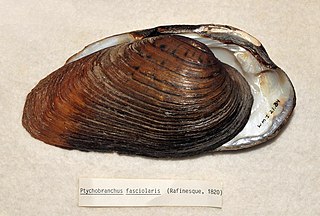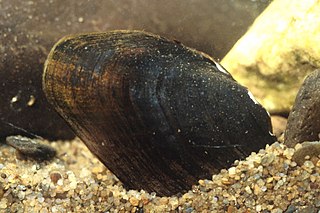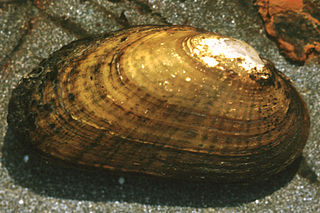The Sydenham River is a river in Kent County, Lambton County and Middlesex County in southwestern Ontario, Canada, flowing southwest from its source west of London, Ontario and emptying into Lake Saint Clair. The length of the river is 165 kilometres (103 mi) and it drains a watershed of approximately 2,700 square kilometres (1,000 sq mi). The river flows through the towns of Strathroy and Wallaceburg. It was named after Lord Sydenham, governor of Canada from 1839 to 1841.

The dwarf wedgemussel is an endangered species of freshwater mussel, an aquatic bivalve mollusk in the family Unionidae, the river mussels.

The northern riffleshell, is a subspecies of freshwater mussel, an aquatic bivalve mollusk in the family Unionidae, the river mussels.
Hay Swamp is a provincially significant wetland complex, 1839 hectares in size, located in parts of the central land areas of the municipalities of Bluewater and South Huron, in southwestern Ontario, Canada. Approximately 13 kilometers (8.1 mi) in length and 2 kilometers (1.2 mi) in width, at its widest point; it consists of 15 extensively forested individual wetlands, situated on either side, of sections of both the upper drainage of the Ausable River and its tributary, Black Creek.

Lampsilis abrupta, the pink mucket or pink mucket pearly mussel, is a species of freshwater mussel, an aquatic bivalve mollusk in the family Unionidae, the river mussels. This species is endemic to the United States.

Lampsilis cariosa,, the yellow lampmussel, is a species of freshwater mussel, an aquatic bivalve mollusk in the family Unionidae, the river mussels.

The Carolina heelsplitter is a species of freshwater mussel, an aquatic bivalve mollusk in the family Unionidae.

Obovaria subrotunda, common name the round hickorynut, is a species of freshwater mussel, an aquatic bivalve mollusk in the family Unionidae, the river mussels.

Potamilus capax, the fat pocketbook pearly mussel or fat pocketbook, is a species of freshwater mussel, an aquatic bivalve mollusk in the family Unionidae, the river mussels.

Ptychobranchus fasciolaris is a species of freshwater mussel in the family Unionidae, the river mussels. Its common name is kidneyshell.

Simpsonaias ambigua, the salamander mussel or mudpuppy mussel, is a species of bivalve in the family Unionidae. It is unique among freshwater mussels in using mudpuppies as its glochidial host. It is the only freshwater mussel known to have a non-fish host.

Villosa is a genus of freshwater mussels, aquatic bivalve molluscs in the family Unionidae.

Lampsilis fasciola, the wavy-rayed lampmussel, is a species of freshwater mussel, an aquatic bivalve mollusk in the family Unionidae, the river mussels.
Pleurobema sintoxia, the round pigtoe, is a species of freshwater mussel, an aquatic bivalve mollusk in the family Unionidae, the river mussels.

Epioblasma triquetra, common name the snuffbox mussel, is a species of freshwater mussel, a mollusk in the family Unionidae. It is native to eastern North America, where it is a listed as an endangered species in both Canada and the United States.
Gonidea angulata, the western ridged mussel or Rocky Mountain ridged mussel, is a species of freshwater mussel, an aquatic bivalve mollusk in the family Unionidae, the river mussels. It is the only species in the genus Gonidea.

Villosa iris, the rainbow mussel or rainbow-shell, is a species of freshwater mussel, an aquatic bivalve mollusk in the family Unionidae, the river mussels.
The Choctaw bean is a species of freshwater mussel, an aquatic bivalve mollusc in the family Unionidae. This species is found in the southeastern United States and is currently on the endangered species list. The species epithet and the common name are based on the name of the Choctaw people, Native Americans who were originally from the southeastern United States.














